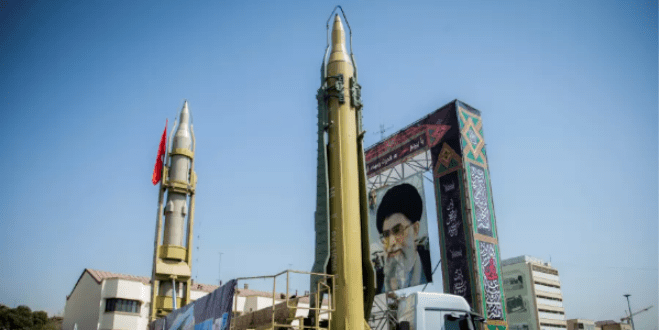In an interview on Russian Today television on Saturday, former Iranian diplomat Amir Mousavi warned that Iran is prepared to retaliate for a wave of recent explosions at key facilities inside Iran which included several nuclear sites.
In the interview, which was translated by the Middle East Media Research Institute (MEMRI), Mosavi noted that the Iranian government suspected three state-perpetrators of the attacks:
“America, the Zionist entity [Israel], and a certain Arab country,” Mosavi said, citing “leaks from some security reports” as the source of the Arab country complicit in the attacks. It should be noted that Iran is a Muslim nation but is not ethnically Arab.
At least five major explosions have taken place at Iranian sites in the past two weeks. At least two of the sites, the Parchin military base and the Natanz nuclear enrichment facility, were part of Iran’s ongoing program to develop nuclear weapons.
Though initially denying the explosions were the results of sabotage, Iran recently began acknowledging the attacks may have been caused by cyberattacks.
“If this proves to be true, I believe that the relevant officials have received instructions to deliver a punishing, powerful, and swift retaliation against whoever decided to participate in this,” Mosavi threatened. “This retaliation is ready in Iran. They are waiting for the report of the national security council to confirm this.”
“I believe the response will be very powerful because the order came from the highest authority in Iran. This must be dealt with quickly and powerfully.”
Mosavi explained that the response will begin by filing a complaint. He then said that Iran would include a “reciprocal response, by cyber means”
“Iran has an advanced elite [cyber] division, as acknowledged by the US,” Mosavi claimed. “Iran has a large army capable of electronic warfare, and it is capable of destroying similar targets.”
“If this war starts, I believe that no one can stop it. In the past year and a half, we noticed that there was an undeclared cyber cease-fire between the Islamic republic on the one hand and the Zionist entity and the US on the other. But if it is proven that the US, the Zionist Entity or one of the Arab countries have resumed these operations, Iran has the necessary power to confront this by cyber measures or even by means of [military] attacks.”
Mosavi’s claim of a cyber ceasefire was a baseless attempt to save face by disregard a recent failed Iranian cyberattack targeti8ng Israeli civilians and a similar but successful Israeli response. An unprecedented Iranian cyberattack targeted six facilities in Israel’s water infrastructure on April 24-25 nearly dumped lethal levels of chemicals into the Israeli civilian water system. Fortunately, the attack impacted some systems but did not cause any disruption in the water supply or waste management. The computer system was breached but the cyberattack was blocked before any damage could be done.
Cyber attacks typically target databases or websites. But this attack was the first of its type, attempting to attack a civilian population.
Israel responded in kind, targeting Iran’s largest port, paralyzing the main economic ingress for several days. All navigation systems of the ships were severely disrupted and everything had to be stopped to avoid collisions between incoming and outgoing vessels.
“Perhaps this frightens those who tremble from the American force but what did America do when its drone was downed in the Strait of Hormuz?” Mosavi said, referring to an incident in June 2019 when Iran shot down a $130 million Global Hawk surveillance drone with a surface-to-air missile over the Strait of Hormuz. Iran claimed the drone was in Iranian airspace but the U.S. asserts that at the time of the attack, the drone was in international space.
Trump ordered strikes on Iranian military targets including radar and missile batteries. Planes were in the air and ships were in position, but no missiles had been fired when the President gave the word to stand down.
A few weeks after the Iranian attack on the drone, the US Cyber Command launched an attack against the Islamic Revolutionary Guard Corps, causing significant damage to Iran’s military command and control systems.
One month later, a US Naval vessel shot down an Iranian drone over the Strait of Hormuz.
“What did America do when the Ayn al-Asad base was attacked by missiles?” Mosavi asked rhetorically, adding (entirely inaccurately), “It was the first attack on American targets since the end of World War II.”
In January, more than a dozen ballistic missiles hit the Ain Al-Asad and Irbil Iraqi airbases in western Iraq which house US troops. No casualties resulted.
Almost immediately after the attack, Iran’s foreign minister, Javad Zarif cited international law to justify their strike. He then asked the US not to escalate.
Iran took & concluded proportionate measures in self-defense under Article 51 of UN Charter targeting base from which cowardly armed attack against our citizens & senior officials were launched.
We do not seek escalation or war, but will defend ourselves against any aggression.
— Javad Zarif (@JZarif) January 8, 2020
The attack on the Iraqi bases came less than one week after the United States killed IRCG Quds Force Maj. Gen. Qassem Soleimani at Baghdad Airport.
“Iran rained down missiles on that base. My colleague is all talk. The US arrogance in the face of the resistance forces is over.”
“We saw how the US forces trembled when the Iranian tankers sailed to Venezuela. It bitterly watched how the Iranian ships challenged it and reached Caracas n Venezuela.”
“Iran has some very powerful global and regional cards up its sleeve. The game has changed. So don’t tremble in the face of America’s power.”




